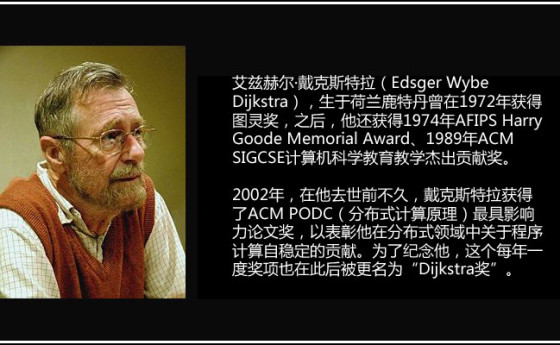计算机大师Dijkstra谈Haskell和Java

原创译文
致预算委员会成员:
我写这封信给你们是因为有传言说,本科教学中的计算机编程入门课程,将用命令式语言Java来代替函数式编程语言Haskell,我认为在这件事上,预算委员会有责任去避免这种错误的决策。
你们可以看到,这不是小事。其它州的同行,经常对于我如何能在德州奥斯汀这样,充满竞争与挑战的地方生存下来感到好奇,他们通常会想当然的认为,德州顽固的保守主义必然造就了同样多顽固的庸人。我的回答几乎总是类似于:“不用担心,计算机科学学院是一个相当开明的地方,例如,在计算机编程入门课程上,我们教新生Haskell语言”;他们的反应起初通常都是怀疑,然后是嫉妒——大多是因为他们的本科课程还没有从Pascal语言向C++或Java这样的语言的转变中恢复过来。
我偏爱函数式编程的一个非常现实的原因是,对于新生的课程,大多数学生都已经对命令式编程有一定的熟悉。让他们面对新奇的函数式编程,能立即传达一个信息:编程比他们想象的要丰富的多。并且,他们很快就会观察到,对于他们用高中时学到的编程知识很难表达或无法表达的问题,函数式编程能提供优雅的解决方案。
而选择函数式编程的一个最根本的原因是,比起命令式编程语言,它更容易当成数学对象来欣赏,在教学中你可以用它解释关于程序严密的推理是什么。另外一个优势是函数式编程的“延迟执行(lazy evaluation)”,它提供了一个环境来防止操作性的推理[1,2]。
最后,在Haskell语言跟Java的具体方面对比中,尽管Haskell不完美,但仍然比Java好几个数量级,Java整个就是一团糟(它是通过大范围的广告和销售员夸张的宣传才达到它的商业认可)。总的来说,这事非常的糟糕,业界把有目共睹的低劣的设计当作了“事实”标准。我个人认为,大学里应该让更健康的编程方式存活下去。
不仅仅小提琴能塑造小提琴家,我们全都被我们自己训练自己去使用的工具所塑造,而在编程语言方面,影响是潜移默化的:它们塑造我们思考的习惯。这使得对第一种编程语言的选择非常的重要。我们应该把入门课程当成一个途径,来创造一种为计算机科学课程的基础服务的文化,而不是去强迫学习一些刚学就容易忘的知识(如果非要这样,那我们过去的,就会永远成为过去)。这个选择肩负着对我们的本科生的重大责任,这也就是为什么这种事不能任由某个主席来决定,而是应该由预算委员会来决定。这种事情也不能让什么公务员或政客办理,而需要有远见的政治家。
Austin, 12 April 2001
Edsger W. Dijkstra
原文
To the members of the Budget Council:
I write to you because of a rumor of efforts to replace the introductory programming course of our undergraduate curriculum the functional programming language Haskell by the imperative language Java, and because I think that in this case the Budget Council has to take responsibility lest the decision be taken at the wrong level.
You see, it is no minor matter. Colleagues from outside the state (still!) often wonder how I can survive in a place like Austin, Texas, automatically assuming that Texas’s solid conservatism guarantees equally solid mediocrity. My usual answer is something like “Don’t worry. The CS Department is quite an enlightened place, for instance for introductory programming we introduce our freshmen to Haskell”; they react first almost with disbelief, and then with envy —usually it turns out that their undergraduate curriculum has not recovered from the transition from Pascal to something like C++ or Java.
A very practical reason for preferring functional programming in a freshman course is that most students already have a certain familiarity with imperative programming. Facing them with the novelty of functional programming immediately drives home the message that there is more to programming than they thought. And quickly they will observe that functional programming elegantly admits solutions that are very hard (or impossible) to formulate with the programming vehicle of their high school days.
A fundamental reason for the preference is that functional programs are much more readily appreciated as mathematical objects than imperative ones, so that you can teach what rigorous reasoning about programs amounts to. The additional advantage of functional programming with “lazy evaluation” is that it provides an environment that discourages operational reasoning[1,2].
Finally, in the specific comparison of Haskell versus Java, Haskell, though not perfect, is of a quality that is several orders of magnitude higher than Java, which is a mess (and needed an extensive advertizing campaign and aggressive salesmanship for its commercial acceptance). It is bad enough that, on the whole, industry accepts designs of well-identified lousiness as “de facto” standards. Personally I think that the University should keep the healthier alternatives alive.
It is not only the violin that shapes the violinist, we are all shaped by the tools we train ourselves to use, and in this respect programming languages have a devious influence: they shape our thinking habits. This circumstance makes the choice of first programming language so important. One would like to use the introductory course as a means of creating a culture that can serve as a basis for computing science curriculum, rather than be forced to start with a lot of unlearning (if that is possible at all: what has become our past, forever remains so). The choice implies a grave responsibility towards our undergraduate students, and that is why it can not be left to a random chairman of something but has to be done by the Budget Council. This is not something that can be left to the civil servants or the politicians; here statesmen are needed.
Austin, 12 April 2001
Edsger W. Dijkstra
28 Sep 2014